- Home
- Cassandra Clare
Chain of Gold Page 5
Chain of Gold Read online
Page 5
James’s mouth curved up into a smile. It was impossible to stay angry with Matthew. It was almost impossible to get angry at Matthew. “Come with me to the ballroom and make up the numbers and we can call it peace.”
Matthew rose obediently—however much he’d drunk, he was always steady on his feet. He helped James up with a firm hand and straightened his jacket to cover the wine stain. “Do you want any of the port in you, or do you only want to wear it?” He offered James the decanter.
James shook his head. His nerves were already frayed, and though the port would soothe them, it would also muddle his thoughts. He wanted to remain sharp—in case. She might not come tonight, he knew. But then again, she might. It had been six months since her last letter, but now she was in London. He needed to be prepared for anything.
Matthew sighed as he set the bottle on the mantel. “You know what they say,” he said, as he and James left the room and began to wend their way back toward the party. “Drink, and you will sleep; sleep, and you will not sin; do not sin, and you will be saved; therefore, drink and be saved.”
“Matthew, you could sin in your sleep,” said a languorous voice.
“Anna,” said Matthew, sagging against James’s shoulder. “Have you been sent to fetch us?”
Lounging against the wall was James’s cousin Anna Lightwood, gorgeously dressed in fitted trousers and a pin-striped shirt. She had the Herondale blue eyes, always disconcerting for James to see, as it felt a bit as if his father were looking at him. “If by ‘fetch,’ you mean ‘drag you back to the ballroom by any means possible,’ ” Anna said. “There are girls who need someone to dance with them and tell them they look pretty, and I cannot do it all on my own.”
The musicians in the ballroom suddenly struck up a tune—a lively waltz.
“Crikey, not waltzing,” said Matthew, in despair. “I loathe waltzing.”
He began to back away. Anna seized him by the back of the coat. “Oh, no, you don’t,” she said, and firmly herded both of them toward the ballroom.
* * *
“Stop looking at yourself,” said Alastair, in a weary tone. “Why are women always looking at themselves? And why are you frowning?”
Cordelia glared into the pier glass at the reflection of her brother. They were all waiting outside the grand ballroom at the Institute, Alastair looking perfect in immaculate black and white, his blond hair slicked back with pomade, hands gloved in kidskin.
Because Mother dresses me, but she lets you wear whatever you like, she thought, but didn’t say it, since their mother was standing right there. Sona was determined to dress Cordelia in the height of fashion, even if the height of fashion didn’t suit her daughter at all. For tonight she’d chosen a dress for Cordelia of pale lilac edged with glittering bugle beads. Her hair was swept up into a waterfall of curls, and her swan-bill corset was making her breathless.
Cordelia was of the opinion that she looked awful. Pastels were all the rage in the fashion papers, but those papers expected girls to be blond, small-bosomed, and pale-skinned. Cordelia was decidedly none of those things. Pastels washed her out, and even the corset couldn’t flatten her chest. Nor was her dark red hair thin and fine: it was thick and long like her mother’s, reaching to her waist when brushed out. It looked ridiculous in tiny curls.
“Because I have to wear a corset, Alastair,” she snapped. “I was checking to see if I’d turned plum-colored.”
“You’d match your dress if you did,” Alastair noted. Cordelia couldn’t help but wish her father were there; he always told her she looked beautiful.
“Children,” said their mother reprovingly. Cordelia had the feeling she would address them as “children” even when they were old and gray and sniping at one another from Bath chairs. “Cordelia, corsets not only create a womanly shape, they show that a lady is finely bred and of delicate sensibilities. Alastair, leave your sister alone. This is a very important evening for all of us, and we must be mindful to make a good impression.”
Cordelia could sense her mother’s unease that she was the only woman in the room wearing a roosari over her hair, her worry that she lacked the knowledge of who the powerful people in the room were, when she would have known it immediately in the salons of the Tehran Institute.
Things would all be different after tonight, Cordelia told herself again. It didn’t matter whether her dress was hideous on her: what mattered was that she charm the influential Shadowhunters in the room who could effect an introduction to the Consul for her. She would make Charlotte understand—she would make them all understand—that her father might be a poor strategist, but it was no reason for him to be in jail. She would make them understand that the Carstairs family had nothing to hide.
She would make her mother smile.
The ballroom doors opened and there was Tessa Herondale in rose chiffon, with small roses in her hair. Cordelia doubted she needed to wear a corset. She was already quite ethereal-looking. It was hard to believe she was the woman who had taken down an army of metal monsters.
“Thank you for waiting,” she said. “I did want to bring you in all together and make the introductions. Everyone is just dying to meet you. Come, come!”
She led them into the ballroom. Cordelia had a faint memory of playing here with Lucie when it had been quite deserted. Now it was full of light and music.
Gone were the heavily brocaded walls of years ago and the massive velvet hangings. Everything was airy and bright, the walls lined with pale wooden benches padded with gold-and-white-striped cushions. A frieze of golden birds darting among trees ran above the curtains—if you looked closely, you could see that they were herons. Hung on the walls was an assortment of ornamental weapons—swords in jeweled scabbards, bows carved of ivory and jade, daggers with pommels in the shapes of sunbursts and angel wings.
Most of the floor had been cleared for dancing, but there was a sideboard laden with glasses and pitchers of iced lemonade. A few tables draped in white were scattered around the room. Older married ladies and some younger ones who didn’t have dancing partners clustered at the walls, busying themselves with gossip.
Cordelia’s gaze instantly searched out Lucie and James. She found Lucie at once, dancing with a young man with sandy hair, but she scanned the room for James’s tousled dark hair in vain. He did not seem to be here.
Not that there was time to dwell on it. Tessa was an expert hostess. Cordelia and her family were whisked from group to group, the introductions made, their virtues and values enumerated. She was introduced to a dark-haired girl a few years older than herself, who looked entirely at ease in a pale green dress trimmed with lace. “Barbara Lightwood,” said Tessa, and Cordelia perked up as they curtsied to each other. The Lightwoods were cousins of James and Lucie’s, and a powerful family in their own right.
Her mother fell immediately into conversation with Barbara’s parents, Gideon and Sophie Lightwood. Cordelia fixed her gaze on Barbara. Would she be interested in hearing about her father? Probably not. She was looking out at the dance floor with a smile on her face.
“Who’s the boy dancing with Lucie?” Cordelia asked, which provoked a surprising burst of laughter from Barbara.
“That’s my brother, Thomas,” she said. “And not tripping over his own feet, for a change!”
Cordelia took another look at the sandy-haired boy laughing with Lucie. Thomas was very tall and broad-shouldered, intimidatingly so. Did Lucie fancy him? If she’d mentioned him in her letters, it was only as one of her brother’s friends.
Alastair, who had been standing at the edge of the group looking bored—truthfully, Cordelia had nearly forgotten he was there—suddenly brightened. “Charles!” he said, sounding pleased. He smoothed down the front of his waistcoat. “If you’ll excuse me, I must go pay my respects. We haven’t seen each other in an age.”
He vanished between the tables without waiting for permission. Cordelia’s mother sighed. “Boys,” she said. “So vexing.”
Sophie smiled at her daughter, and Cordelia noticed for the first time the vicious scar that slashed across her cheek. There was something about her vivaciousness, the way she moved and spoke, that caused one not to see it at first. “Girls have their moments,” she observed. “You should have seen Barbara and her sister, Eugenia, when they were children. Absolute horrors!”
Barbara laughed. Cordelia envied her, to have such an easy rapport with her mother. A moment later a brown-haired boy approached and invited Barbara to dance; she was whisked away, and Tessa steered Sona and Cordelia to the next table, where Lucie’s uncle Gabriel Lightwood sat beside a beautiful woman with long dark hair and blue eyes—his wife, Cecily. Will Herondale was leaning against the edge of their table, arms folded, smiling.
Will looked over as they approached, and his face softened when he saw Tessa, and behind her, Cordelia. In him, Cordelia could see a bit of what James would become when he was grown.
“Cordelia Carstairs,” he said, after greeting her mother. “How pretty you’ve become.”
Cordelia beamed. If Will thought she was pretty, perhaps his son thought so too. Of course, due to Will’s prejudice toward all things Carstairs, he probably thought Alastair was perfect and also pretty.
“I hear you have come to London to be parabatai with our Lucie,” said Cecily. She looked nearly as young as Tessa, though since she wasn’t an immortal warlock, one wondered how she managed it. “I am pleased—it is high time more girls became parabatai. It has been a state monopolized by men for far too long.”
“Well, the first parabatai were male,” Will pointed out, in a manner that made Cordelia wonder if Cecily had once found him insufferable, as she found Alastair.
“Times are changing, Will,” said Cecily with a smile. “It’s the modern age. We have electric lights, motorcars…”
“Mundanes have electric lights,” said Will. “We have witchlight.”
“And motorcars are a fad,” said Gabriel Lightwood. “They won’t last.”
Cordelia bit her lip. This was not at all how she wanted the evening to go. She was meant to be charming people and influencing them, but instead she felt like a child banished to the perimeter of adult conversation about motorcars. It was with extreme relief that she saw Lucie abandon Thomas on the dance floor and race over to her. They hugged, and Cordelia exclaimed over Lucie’s pretty blue lace dress, while Lucie stared in horror at Cordelia’s lilac nightmare.
“May I take Cordelia to meet the other girls?” she said to Sona, smiling her most charming smile.
“Of course.” Sona looked pleased. It was, after all, what she had brought Cordelia here for, wasn’t it? To meet the sons and daughters of influential Shadowhunters? Though really, Cordelia knew, more the sons than the daughters.
Lucie took Cordelia’s hand and drew her over to the refreshment table, where a group of girls in colorful dresses had gathered. In the avalanche of introductions, Cordelia caught only a few of their names: Catherine Townsend, Rosamund Wentworth, and Ariadne Bridgestock, who must be related to the Inquisitor. She was a tall, lovely-looking girl a few years older than the others, with brown skin a shade darker than Cordelia’s own.
“What a pretty dress,” Ariadne said to Cordelia, her voice warm. Her own gown was of flattering wine-colored silk. “I believe that’s the shade they call ‘ashes of roses.’ Very popular in Paris.”
“Oh, yes,” Cordelia said eagerly. She’d known so few girls growing up—just Lucie, really—so how did one impress them and charm them? It was desperately important. “I did get this dress in Paris, as a matter of fact. On Rue de la Paix. Jeanne Paquin made it herself.”
She saw Lucie’s eyes widen in concern. Rosamund’s lips tightened. “How fortunate you are,” she said coolly. “Most of us here in the poky little London Enclave rarely get to travel abroad. You must think us so dull.”
“Oh,” said Cordelia, realizing she had put her foot in it. “No, not at all—”
“My mother has always said Shadowhunters aren’t meant to have much of an interest in fashion,” said Catherine. “She says it’s mundane.”
“Since you’ve spoken of Matthew’s clothes admiringly so often,” said Ariadne tartly, “should we assume that rule is only for girls?”
“Ariadne, really—” Rosamund began, and broke off with a laugh. “Speak of the devils,” she said. “Look who’s just come in.”
She was looking toward the far doors of the ballroom, through which two boys had just spilled. Cordelia saw James first, as she always did. He was tall, beautiful, smiling: a painter’s vision in black and white with tousled ebony hair.
She heard Lucie groan as the girls whispered among themselves: she caught James’s name in the whispers, and then a second name in the same breath: Matthew Fairchild.
Of course. James’s parabatai. It had been years since Cordelia had seen him. She remembered a slim blond boy. Now he was a well-built young man, his hair darkened to bronze, with a face like a dissipated angel.
“They are so handsome,” said Catherine, sounding almost pained. “Don’t you think so, Ariadne?”
“Oh—yes,” Ariadne said hastily. “I suppose.”
“She only has eyes for Charles,” said Rosamund. Ariadne turned red, and the girls went off into gales of laughter. All but Lucie, who rolled her eyes.
“They’re just boys,” she said.
“James is your brother,” said Catherine. “You cannot be objective, Lucie! He is gorgeous.”
Cordelia had begun to feel a certain dismay. James, it seemed, was not her discovery alone. He and Matthew had stopped to laugh with Barbara and her dance partner; James had an arm slung over Matthew’s shoulder and was smiling. He was so beautiful it was like an arrow in the heart to look at him. Of course she was not the only one to have noticed. Surely James could have his pick of girls.
“Matthew isn’t bad-looking either,” said Rosamund. “But so scandalous.”
“Indeed,” Catherine added, eyes sparkling. “You must be careful of him, Miss Carstairs. He has a reputation.”
Lucie began to turn an angry shade of pink.
“We should guess who James will ask to dance first,” said a fair-haired girl in a pink dress. “Surely you, Rosamund; you are looking so lovely tonight. Who could resist you?”
“Ah, yes, who will be graced by my brother’s attentions?” drawled Lucie. “When he was six, he threw up in his own shoe.”
The others girls pointedly ignored her as the music began once more. Someone who appeared to be Rosamund’s brother came to claim the fair-haired girl for a dance; Charles left Alastair and came across the room to take Ariadne’s hand and whisk her onto the floor. Will and Tessa were in each other’s arms, as were both sets of Lucie’s aunts and uncles.
A moment later Matthew Fairchild approached the table. He was suddenly startlingly close to Cordelia. She could see that his eyes were not dark, as she had thought, but a deep shade of green like forest moss. He bowed slightly to Lucie. “Might I have this dance?”
Lucie cast a glance back at the other girls that Cordelia could read as clearly as words on a page. She was not concerned about Matthew’s reputation, the look said. Head held high, Lucie sailed out onto the dance floor with the Consul’s second son.
Which was commendable of her, Cordelia thought, but it did leave Cordelia alone with a group of girls she was not sure liked her. She could hear a few of them whispering that she seemed terribly pleased with herself, and she thought she caught her father’s name, too, and the word “trial”—
Cordelia stiffened her spine. She had made a mistake in mentioning Paris; she would not compound it by seeming weak. She gazed out upon the dance floor, a smile glued to her lips. She caught sight of her brother, now in conversation with Thomas Lightwood. The two boys sat casually on a rout-seat together, as if they were exchanging confidences. Even Alastair was doing a better job of charming the influential than she was.
Not far from them, leaning against a wall, was a
girl dressed in the height of fashion—men’s fashion. Tall and almost painfully slender, she had dark, dark hair like Will and James did. Hers was cut short and smoothed down with pomade, the edges finger-combed into careful curls. Her hands were long, ink-and-tobacco-stained and beautiful to look at, like the hands on a statue. She was smoking a cheroot, the smoke drifting up past her face, which was unusual: fine-boned and sharp edged.
Anna, Cordelia realized. This was Anna Lightwood, Lucie’s cousin. She was certainly the most intimidating person in the room.
“Oh, my,” said Catherine, as the music rose. “It’s a waltz.”
Cordelia glanced down. She knew how to dance: her mother had engaged an expert instructor to teach her the quadrille and the lancer, the stately minuet and the cotillion. But the waltz was a seductive dance, one where you could feel your partner’s body against yours, scandalous when it had first become popular. She’d never learned it.
She very much wanted to dance it with James. But he probably didn’t even wish to dance at all; he probably wanted to talk with his friends, as any young man would. She heard another spate of giggles and whispers, and Catherine’s voice saying, “Isn’t she that girl whose father—”
“Daisy? Would you like to dance?”
There was only one boy who called her that. She looked up, incredulous, to see James standing in front of her.
His beautiful hair was disorderly, as it always was, and more charming for that: a lock of it fell over his forehead, and his lashes were thick and dark over his pale gold eyes. His cheekbones arched like wings.
The group of girls had fallen into a stunned silence. Cordelia felt as if she might be floating.
“I don’t,” she faltered, having no idea what she was saying, “quite know how to waltz.”
“Then I shall teach you,” James said, and a moment later they had whirled out onto the dance floor.
“Thank goodness you were free,” James said with frank cheerfulness as they moved among the other couples, searching for a space. “I was afraid I’d have to ask Catherine to dance, and all she talks about is how scandalous Matthew is.”

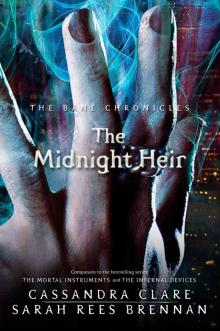 The Midnight Heir
The Midnight Heir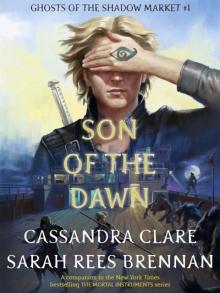 Son of the Dawn
Son of the Dawn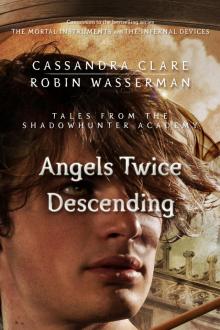 Angels Twice Descending
Angels Twice Descending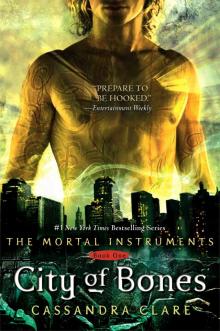 City of Bones
City of Bones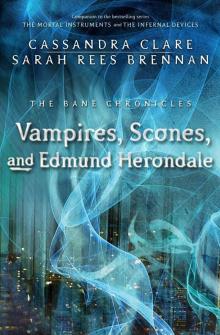 Vampires, Scones, and Edmund Herondale
Vampires, Scones, and Edmund Herondale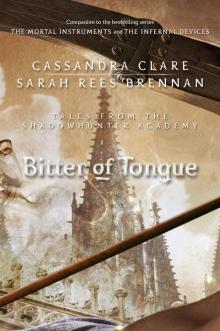 Bitter of Tongue
Bitter of Tongue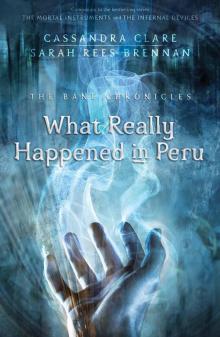 What Really Happened in Peru
What Really Happened in Peru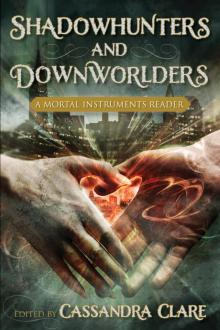 Shadowhunters and Downworlders
Shadowhunters and Downworlders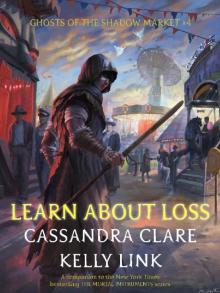 Learn About Loss
Learn About Loss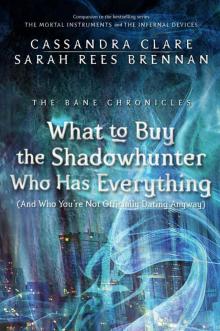 What to Buy the Shadowhunter Who Has Everything
What to Buy the Shadowhunter Who Has Everything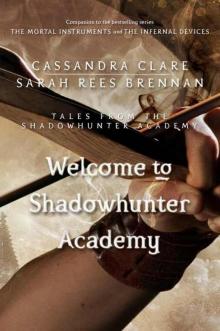 Welcome to Shadowhunter Academy
Welcome to Shadowhunter Academy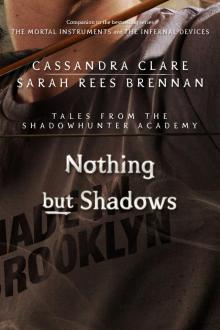 Nothing but Shadows
Nothing but Shadows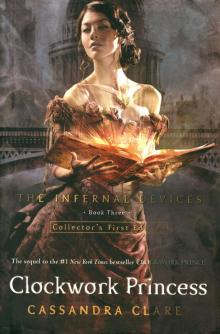 Clockwork Prince
Clockwork Prince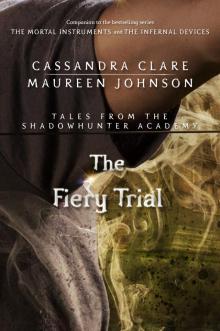 The Fiery Trial
The Fiery Trial City of Glass
City of Glass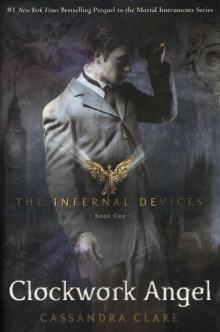 Clockwork Angel
Clockwork Angel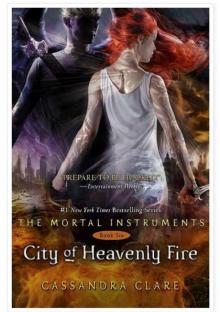 City of Heavenly Fire
City of Heavenly Fire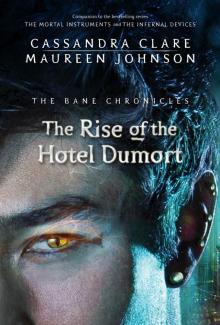 The Rise of the Hotel Dumort
The Rise of the Hotel Dumort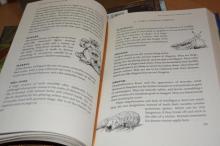 The Shadowhunters Codex
The Shadowhunters Codex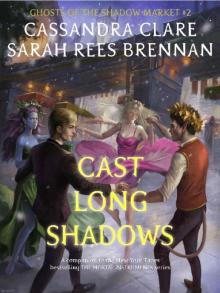 Cast Long Shadows
Cast Long Shadows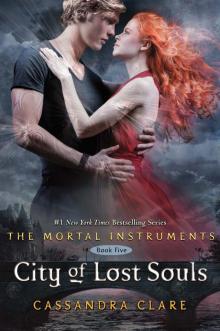 City of Lost Souls
City of Lost Souls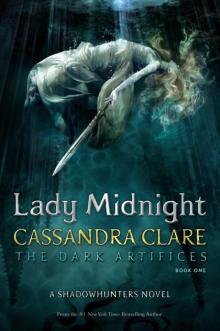 Lady Midnight
Lady Midnight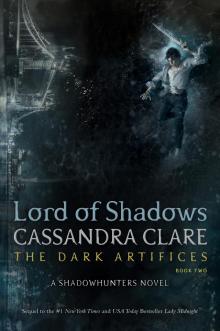 Lord of Shadows
Lord of Shadows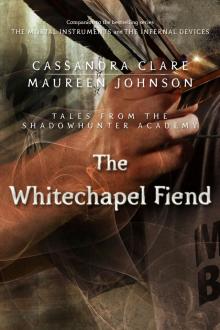 The Whitechapel Fiend
The Whitechapel Fiend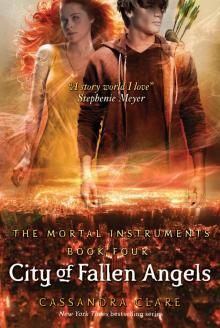 City of Fallen Angels
City of Fallen Angels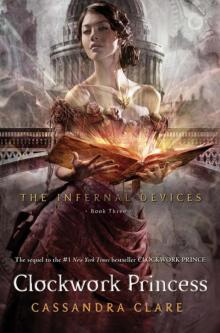 Clockwork Princess
Clockwork Princess Queen of Air and Darkness
Queen of Air and Darkness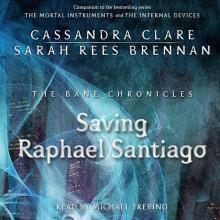 Saving Raphael Santiago
Saving Raphael Santiago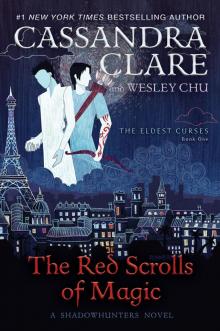 The Red Scrolls of Magic
The Red Scrolls of Magic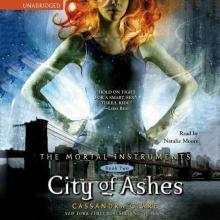 City of Ashes
City of Ashes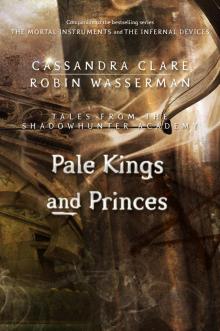 Pale Kings and Princes
Pale Kings and Princes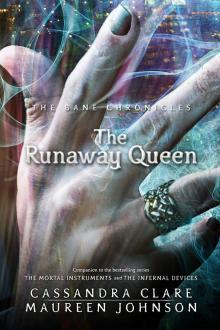 The Runaway Queen
The Runaway Queen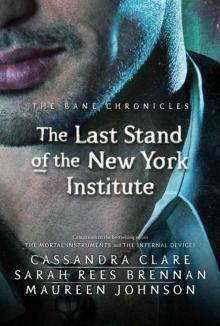 The Last Stand of the New York Institute
The Last Stand of the New York Institute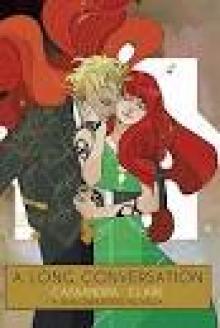 A Long Conversation (The Shadowhunter Chronicles)
A Long Conversation (The Shadowhunter Chronicles)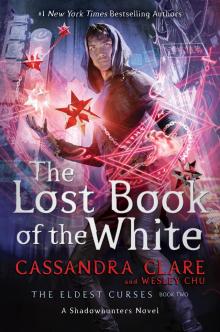 The Lost Book of the White
The Lost Book of the White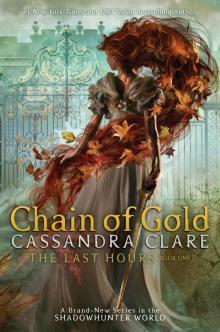 Chain of Gold
Chain of Gold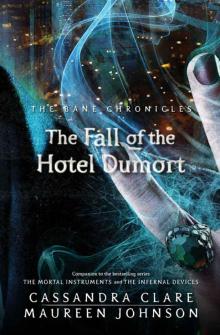 The Fall of the Hotel Dumort
The Fall of the Hotel Dumort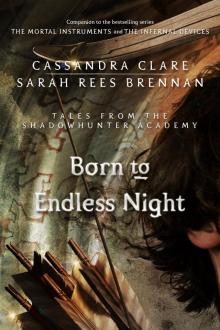 Born to Endless Night
Born to Endless Night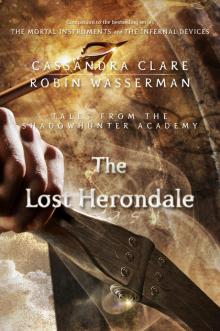 The Lost Herondale
The Lost Herondale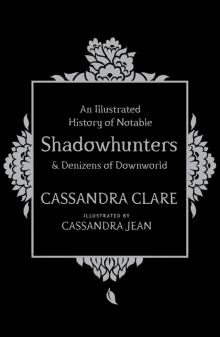 An Illustrated History of Notable Shadowhunters & Denizens of Downworld
An Illustrated History of Notable Shadowhunters & Denizens of Downworld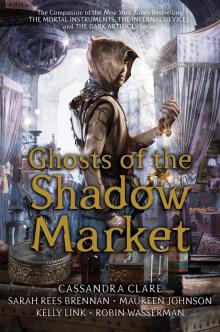 Ghosts of the Shadow Market
Ghosts of the Shadow Market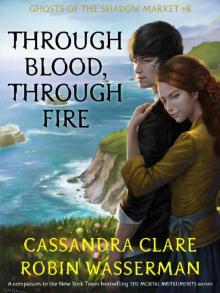 Through Blood, Through Fire
Through Blood, Through Fire Every Exquisite Thing
Every Exquisite Thing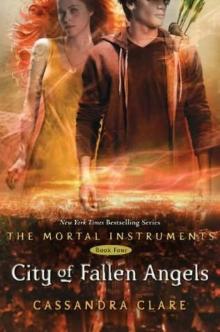 City of Fallen Angels mi-4
City of Fallen Angels mi-4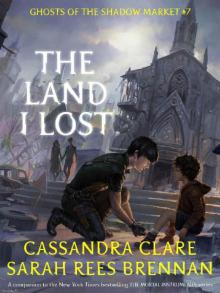 The Land I Lost (Ghosts of the Shadow Market Book 7)
The Land I Lost (Ghosts of the Shadow Market Book 7) Queen of Air and Darkness (The Dark Artifices #3)
Queen of Air and Darkness (The Dark Artifices #3)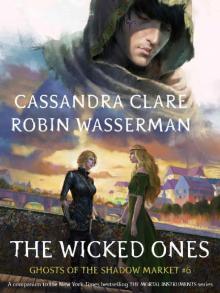 The Wicked Ones (Ghosts of the Shadow Market Book 6)
The Wicked Ones (Ghosts of the Shadow Market Book 6)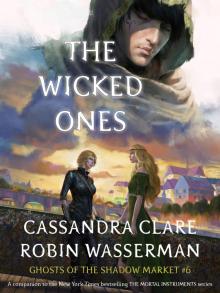 The Wicked Ones
The Wicked Ones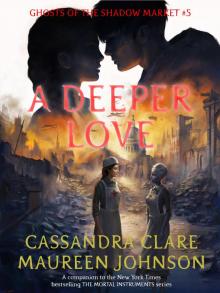 A Deeper Love
A Deeper Love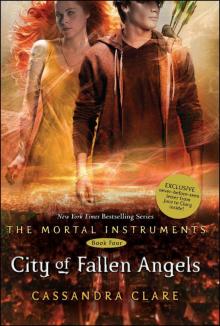 City of Fallen Angels (4)
City of Fallen Angels (4)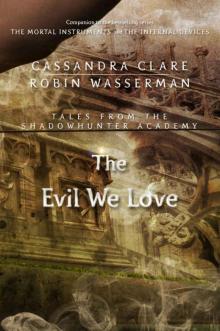 The Evil We Love (Tales from the Shadowhunter Academy Book 5)
The Evil We Love (Tales from the Shadowhunter Academy Book 5)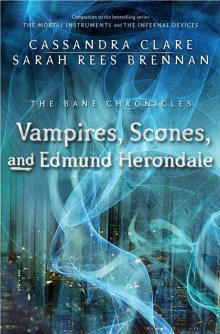 Vampires, Scones, and Edmund Herondale tbc-3
Vampires, Scones, and Edmund Herondale tbc-3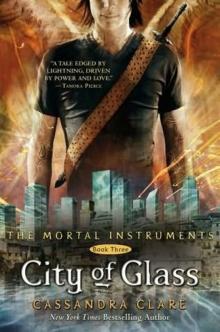 City of Glass mi-3
City of Glass mi-3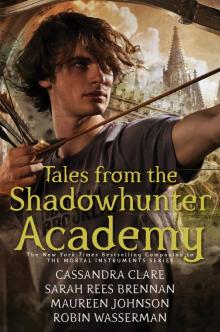 Tales from the Shadowhunter Academy
Tales from the Shadowhunter Academy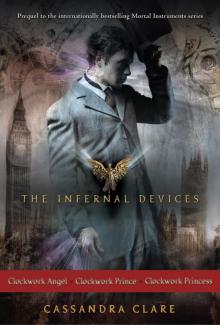 The Infernal Devices Series
The Infernal Devices Series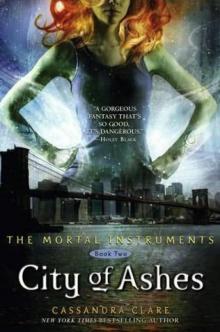 City of Ashes mi-2
City of Ashes mi-2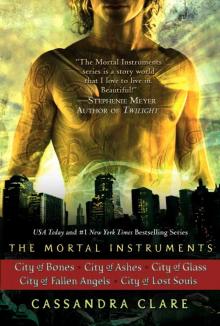 Cassandra Clare: The Mortal Instruments Series
Cassandra Clare: The Mortal Instruments Series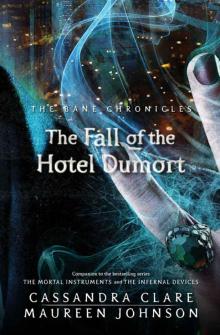 The Bane Chronicles 7: The Fall of the Hotel Dumort
The Bane Chronicles 7: The Fall of the Hotel Dumort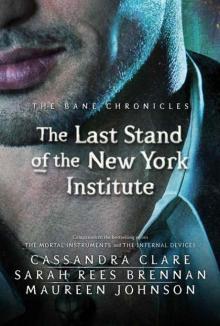 The Last Stand of the New York Institute (The Bane Chronicles)
The Last Stand of the New York Institute (The Bane Chronicles)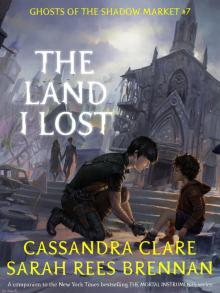 The Land I Lost
The Land I Lost![Saving Raphael Santiago - [Bane Chronicles 06] Read online](http://i1.bookreadfree.com/i1/04/03/saving_raphael_santiago_-_bane_chronicles_06_preview.jpg) Saving Raphael Santiago - [Bane Chronicles 06]
Saving Raphael Santiago - [Bane Chronicles 06]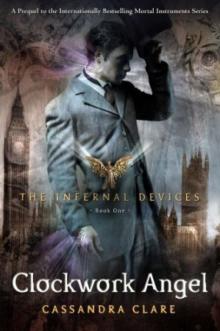 Clockwork Angel tid-1
Clockwork Angel tid-1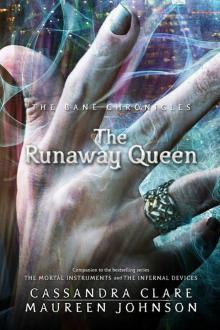 The Runaway Queen tbc-2
The Runaway Queen tbc-2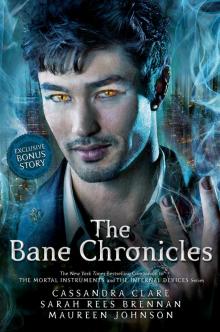 The Bane Chronicles
The Bane Chronicles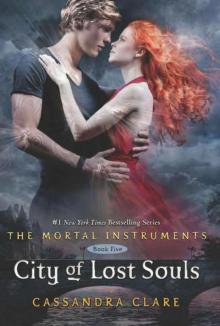 City of Lost Souls mi-5
City of Lost Souls mi-5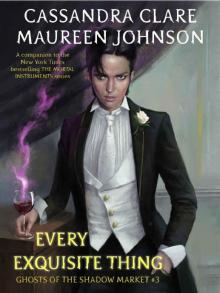 Every Exquisite Thing (Ghosts of the Shadow Market Book 3)
Every Exquisite Thing (Ghosts of the Shadow Market Book 3)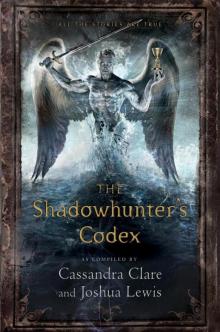 Shadowhunter’s Codex
Shadowhunter’s Codex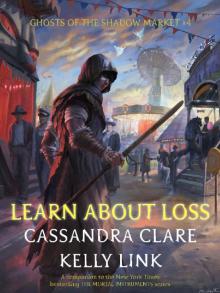 Learn About Loss (Ghosts of the Shadow Market Book 4)
Learn About Loss (Ghosts of the Shadow Market Book 4)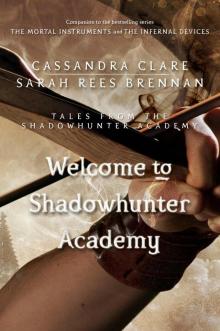 Welcome to Shadowhunter Academy (Tales from the Shadowhunter Academy Book 1)
Welcome to Shadowhunter Academy (Tales from the Shadowhunter Academy Book 1)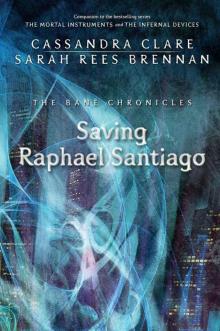 Saving Raphael Santiago tbc-6
Saving Raphael Santiago tbc-6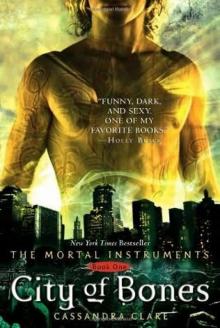 City of Bones mi-1
City of Bones mi-1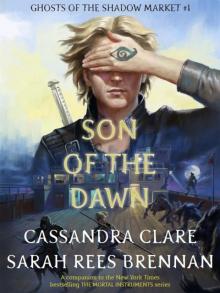 Ghosts of the Shadow Market Book 1_Son of the Dawn
Ghosts of the Shadow Market Book 1_Son of the Dawn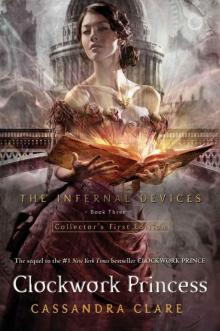 Clockwork Princess (Infernal Devices, The)
Clockwork Princess (Infernal Devices, The) Clockwork Prince tid-2
Clockwork Prince tid-2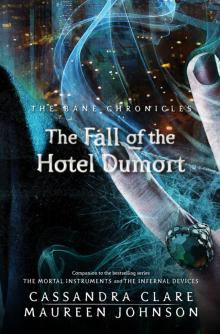 No Immortal Can Keep a Secret
No Immortal Can Keep a Secret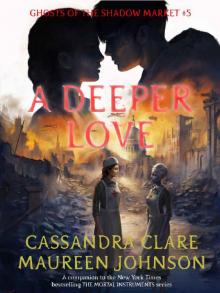 A Deeper Love (Ghosts of the Shadow Market Book 5)
A Deeper Love (Ghosts of the Shadow Market Book 5)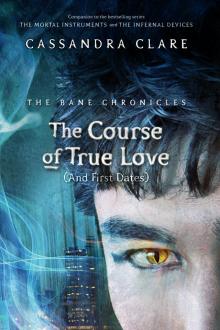 The Course of True Love (and First Dates)
The Course of True Love (and First Dates)